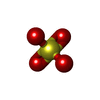[English] 日本語
 Yorodumi
Yorodumi- PDB-6vka: HIV Integrase Core domain (IN) in complex with dimer-spanning ligand -
+ Open data
Open data
- Basic information
Basic information
| Entry | Database: PDB / ID: 6vka | ||||||
|---|---|---|---|---|---|---|---|
| Title | HIV Integrase Core domain (IN) in complex with dimer-spanning ligand | ||||||
 Components Components | Integrase | ||||||
 Keywords Keywords |  TRANSFERASE / TRANSFERASE /  Virus / Inhibitor / Virus / Inhibitor /  Complex / Complex /  HIV Integrase HIV Integrase | ||||||
| Function / homology |  Function and homology information Function and homology informationDNA integration / viral genome integration into host DNA / establishment of integrated proviral latency /  RNA-directed DNA polymerase activity / RNA-directed DNA polymerase activity /  endonuclease activity / DNA recombination / symbiont entry into host cell / endonuclease activity / DNA recombination / symbiont entry into host cell /  DNA binding / zinc ion binding DNA binding / zinc ion bindingSimilarity search - Function | ||||||
| Biological species |    Human immunodeficiency virus 1 Human immunodeficiency virus 1 | ||||||
| Method |  X-RAY DIFFRACTION / X-RAY DIFFRACTION /  SYNCHROTRON / SYNCHROTRON /  FOURIER SYNTHESIS / Resolution: 1.863 Å FOURIER SYNTHESIS / Resolution: 1.863 Å | ||||||
 Authors Authors | Gorman, M.A. / Parker, M.W. | ||||||
 Citation Citation |  Journal: To Be Published Journal: To Be PublishedTitle: HIV Integrase core domain (IN) in complex with dimeric spanning inhibitor Authors: Scanlon, M. / Gorman, M.A. | ||||||
| History |
|
- Structure visualization
Structure visualization
| Structure viewer | Molecule:  Molmil Molmil Jmol/JSmol Jmol/JSmol |
|---|
- Downloads & links
Downloads & links
- Download
Download
| PDBx/mmCIF format |  6vka.cif.gz 6vka.cif.gz | 118.4 KB | Display |  PDBx/mmCIF format PDBx/mmCIF format |
|---|---|---|---|---|
| PDB format |  pdb6vka.ent.gz pdb6vka.ent.gz | 98.3 KB | Display |  PDB format PDB format |
| PDBx/mmJSON format |  6vka.json.gz 6vka.json.gz | Tree view |  PDBx/mmJSON format PDBx/mmJSON format | |
| Others |  Other downloads Other downloads |
-Validation report
| Arichive directory |  https://data.pdbj.org/pub/pdb/validation_reports/vk/6vka https://data.pdbj.org/pub/pdb/validation_reports/vk/6vka ftp://data.pdbj.org/pub/pdb/validation_reports/vk/6vka ftp://data.pdbj.org/pub/pdb/validation_reports/vk/6vka | HTTPS FTP |
|---|
-Related structure data
- Links
Links
- Assembly
Assembly
| Deposited unit | 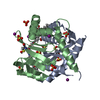
| ||||||||
|---|---|---|---|---|---|---|---|---|---|
| 1 |
| ||||||||
| Unit cell |
|
- Components
Components
| #1: Protein |  Mass: 18001.420 Da / Num. of mol.: 2 / Fragment: UNP residues 50-212 / Mutation: Q53E, C56S, W131E, F185K, Q209E Source method: isolated from a genetically manipulated source Source: (gene. exp.)    Human immunodeficiency virus 1 / Gene: pol / Production host: Human immunodeficiency virus 1 / Gene: pol / Production host:   Escherichia coli (E. coli) Escherichia coli (E. coli)References: UniProt: F2WR39,  Transferases; Transferring phosphorus-containing groups; Nucleotidyltransferases Transferases; Transferring phosphorus-containing groups; Nucleotidyltransferases#2: Chemical | ChemComp-IOD /  Iodide Iodide#3: Chemical | ChemComp-QZV / | #4: Chemical | ChemComp-SO4 /  Sulfate Sulfate#5: Water | ChemComp-HOH / |  Water WaterHas ligand of interest | Y | |
|---|
-Experimental details
-Experiment
| Experiment | Method:  X-RAY DIFFRACTION / Number of used crystals: 1 X-RAY DIFFRACTION / Number of used crystals: 1 |
|---|
- Sample preparation
Sample preparation
| Crystal | Density Matthews: 2.06 Å3/Da / Density % sol: 40.15 % / Description: Bi-pyramid |
|---|---|
Crystal grow | Temperature: 294 K / Method: vapor diffusion, sitting drop / Details: 2.2 M ammonium sulfate, 200 mM potassium iodide |
-Data collection
| Diffraction | Mean temperature: 100 K / Serial crystal experiment: N |
|---|---|
| Diffraction source | Source:  SYNCHROTRON / Site: SYNCHROTRON / Site:  Australian Synchrotron Australian Synchrotron  / Beamline: MX1 / Wavelength: 0.96 Å / Beamline: MX1 / Wavelength: 0.96 Å |
| Detector | Type: ADSC QUANTUM 210r / Detector: CCD / Date: Jun 10, 2016 |
| Radiation | Monochromator: Si(111) / Protocol: SINGLE WAVELENGTH / Monochromatic (M) / Laue (L): M / Scattering type: x-ray |
| Radiation wavelength | Wavelength : 0.96 Å / Relative weight: 1 : 0.96 Å / Relative weight: 1 |
| Reflection | Resolution: 1.86→46.34 Å / Num. obs: 23848 / % possible obs: 98.59 % / Redundancy: 8.6 % / Biso Wilson estimate: 22.92 Å2 / CC1/2: 0.99 / CC star: 1 / Rmerge(I) obs: 0.083 / Rpim(I) all: 0.03 / Rrim(I) all: 0.088 / Net I/av σ(I): 23.57 / Net I/σ(I): 23.57 |
| Reflection shell | Resolution: 1.86→1.93 Å / Redundancy: 8.4 % / Rmerge(I) obs: 0.767 / Mean I/σ(I) obs: 3.03 / Num. unique obs: 2344 / CC1/2: 0.735 / CC star: 0.92 / Rpim(I) all: 0.277 / Rrim(I) all: 0.816 / % possible all: 96.58 |
- Processing
Processing
| Software |
| |||||||||||||||||||||||||||||||||||||||||||||||||||||||||||||||||||||||||||||||||||||||||||||||||||||||||||||||||||||||||||||||||||||||||||||||||||
|---|---|---|---|---|---|---|---|---|---|---|---|---|---|---|---|---|---|---|---|---|---|---|---|---|---|---|---|---|---|---|---|---|---|---|---|---|---|---|---|---|---|---|---|---|---|---|---|---|---|---|---|---|---|---|---|---|---|---|---|---|---|---|---|---|---|---|---|---|---|---|---|---|---|---|---|---|---|---|---|---|---|---|---|---|---|---|---|---|---|---|---|---|---|---|---|---|---|---|---|---|---|---|---|---|---|---|---|---|---|---|---|---|---|---|---|---|---|---|---|---|---|---|---|---|---|---|---|---|---|---|---|---|---|---|---|---|---|---|---|---|---|---|---|---|---|---|---|---|
| Refinement | Method to determine structure : :  FOURIER SYNTHESIS / Resolution: 1.863→46.302 Å / Cross valid method: THROUGHOUT / σ(F): 19.31 / Phase error: 30.21 FOURIER SYNTHESIS / Resolution: 1.863→46.302 Å / Cross valid method: THROUGHOUT / σ(F): 19.31 / Phase error: 30.21
| |||||||||||||||||||||||||||||||||||||||||||||||||||||||||||||||||||||||||||||||||||||||||||||||||||||||||||||||||||||||||||||||||||||||||||||||||||
| Solvent computation | Shrinkage radii: 0.9 Å / VDW probe radii: 1.11 Å | |||||||||||||||||||||||||||||||||||||||||||||||||||||||||||||||||||||||||||||||||||||||||||||||||||||||||||||||||||||||||||||||||||||||||||||||||||
| Refinement step | Cycle: LAST / Resolution: 1.863→46.302 Å
| |||||||||||||||||||||||||||||||||||||||||||||||||||||||||||||||||||||||||||||||||||||||||||||||||||||||||||||||||||||||||||||||||||||||||||||||||||
| Refine LS restraints |
| |||||||||||||||||||||||||||||||||||||||||||||||||||||||||||||||||||||||||||||||||||||||||||||||||||||||||||||||||||||||||||||||||||||||||||||||||||
| LS refinement shell |
|
 Movie
Movie Controller
Controller


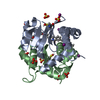
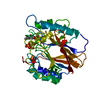
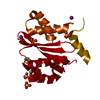
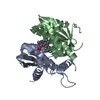

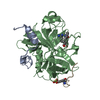
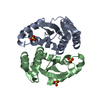
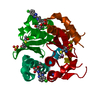
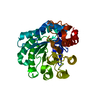
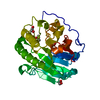
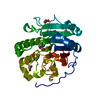
 PDBj
PDBj



